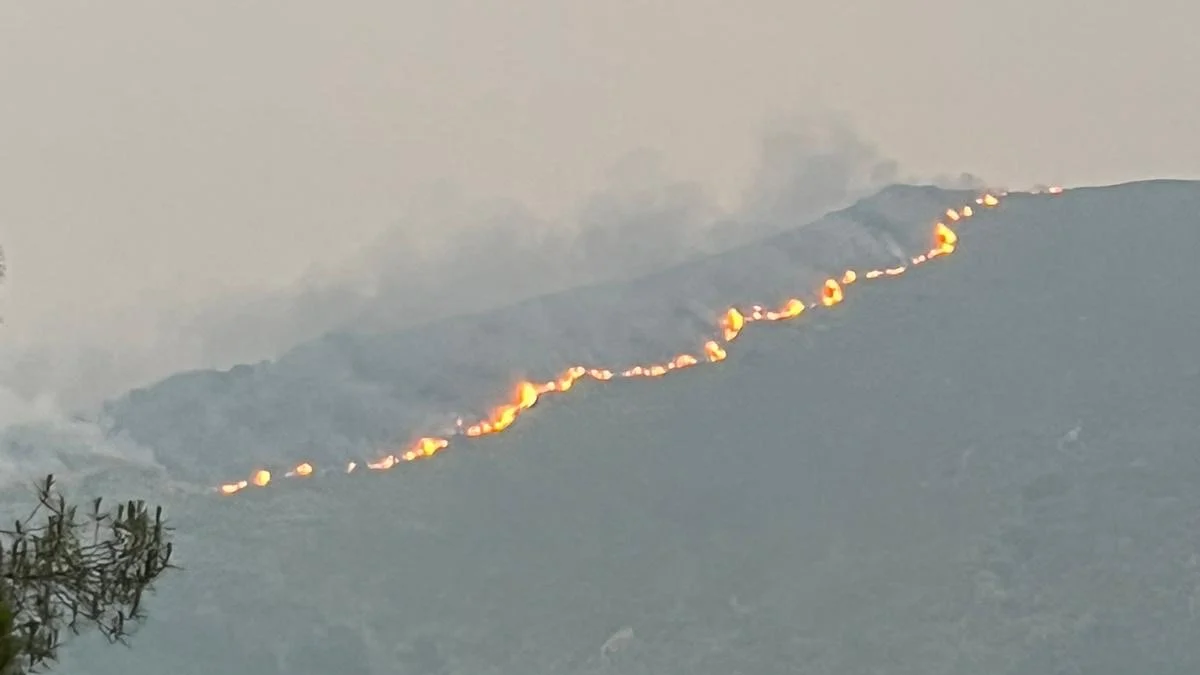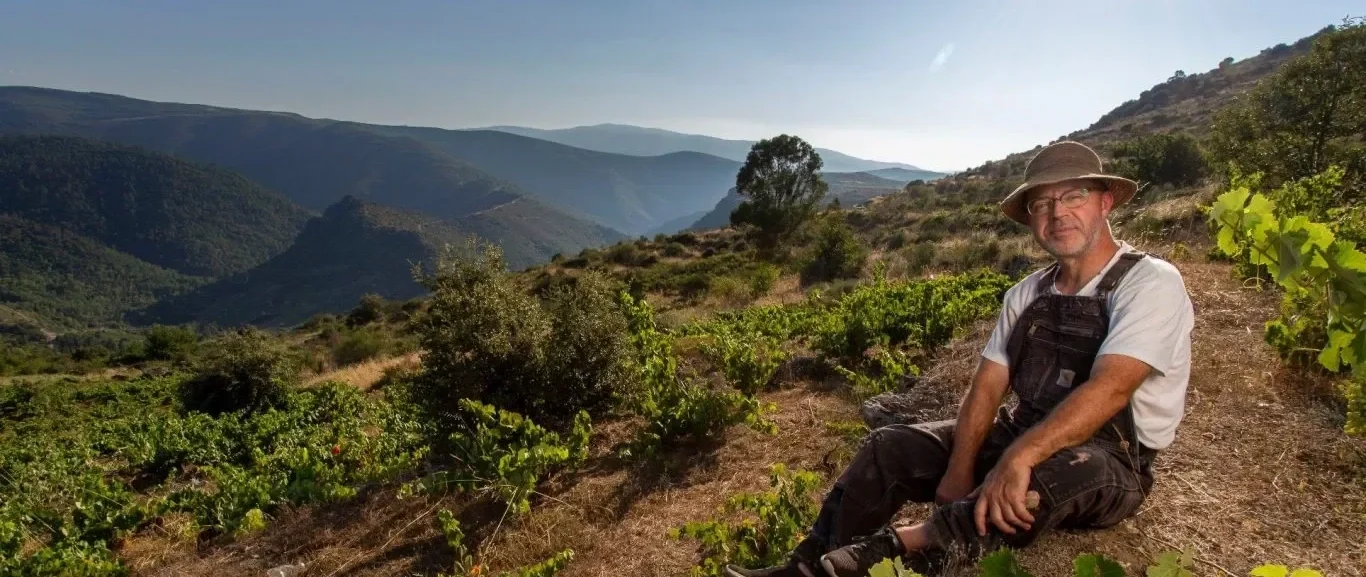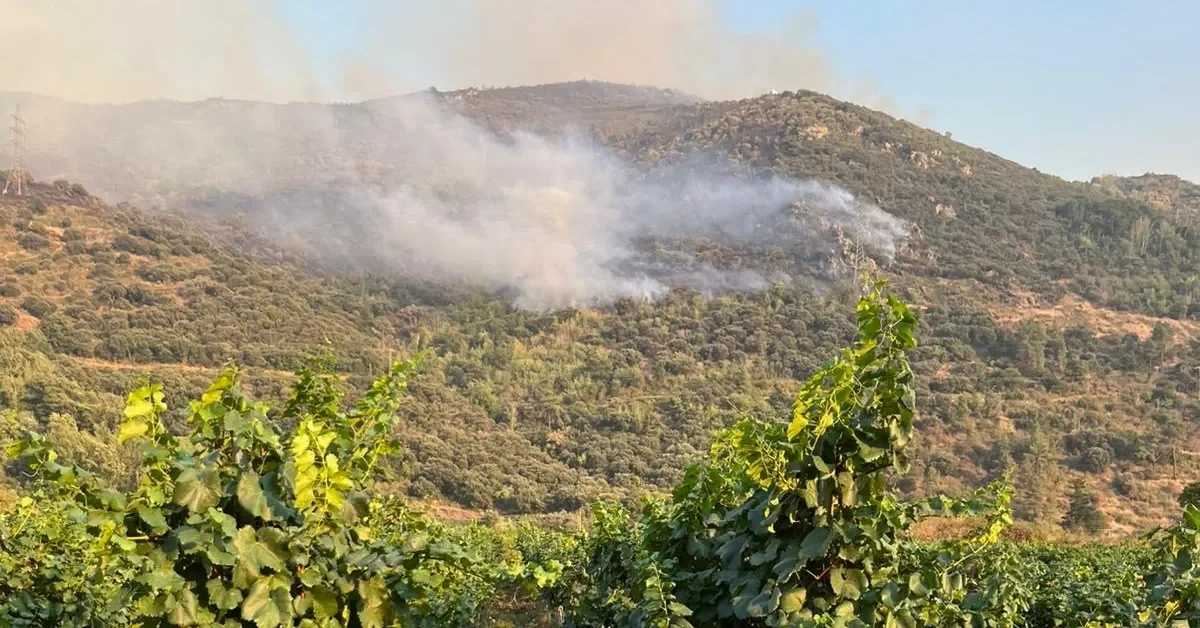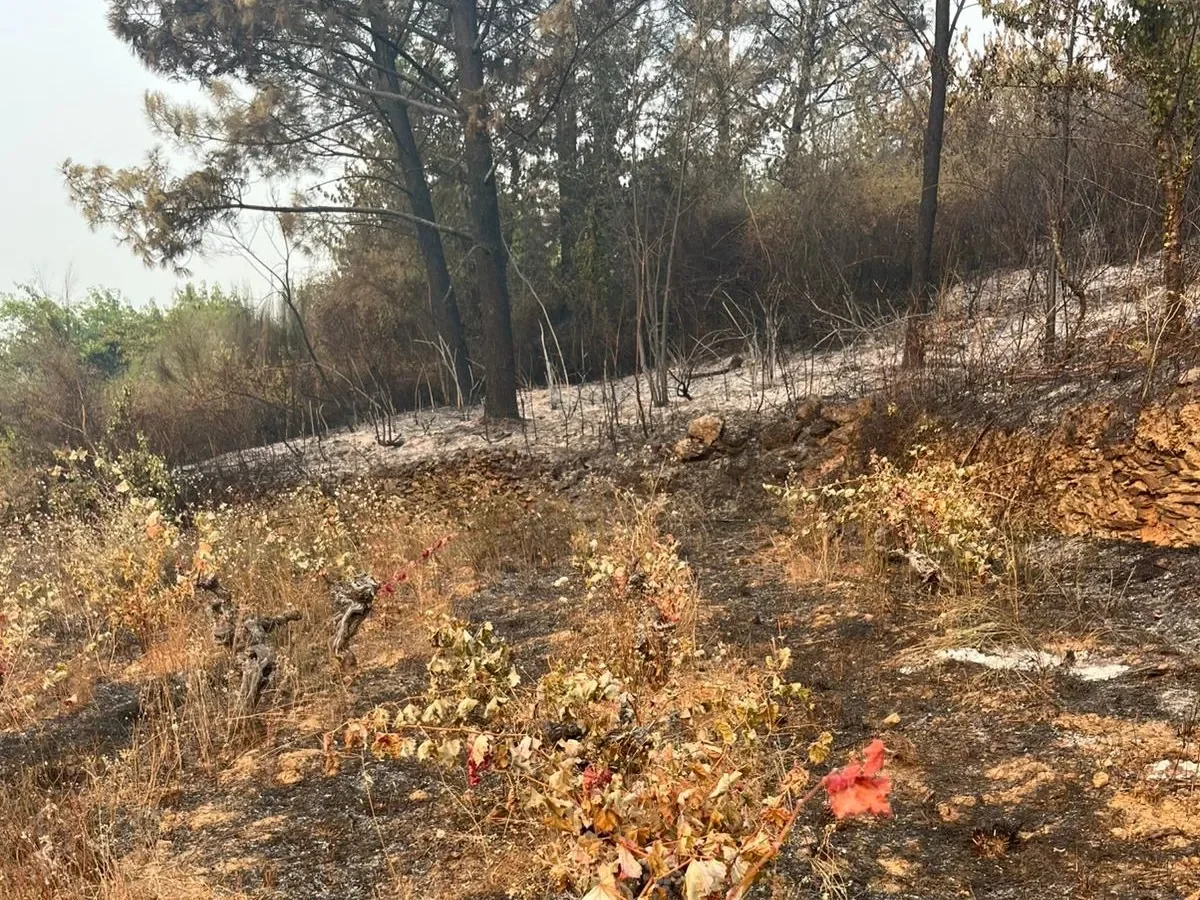“We’re completely abandoned.”
Nacho Gonzalez is used to a struggle. When other growers saw his vineyards in Larouco, Galicia, where he eschews herbicides and lets grass grow almost to the point of obscuring the vines, they called them lost, or “perdida” in Spanish. Nacho decided to adopt the nickname and use it for his winery, which is called La Perdida.
He’s no stranger to patience: he finds old, isolated, and often abandoned vineyards, nurses them back to health, and regenerates their soils via organic and biodynamic farming.
Nor is he afraid of being outspoken. Although he’s geographically within the Valdeorras DO, he has no interest in the Valdeorras back label appearing on his bottles, taking issue with the DO’s allowance of large-scale farming and the dominance of single-varietal Godello.
But nothing could have prepared him for the wildfire that broke out in his village on August 13. The Seadur-Larouco wildfire would go on to burn over 30,000 hectares (74,100 acres), making it the worst wildfire in Galicia since records began. Some of Nacho’s vineyards did not survive the blaze. Ten days later, the fire was finally brought under control. Now, Nacho’s criticism is trained on the government as he gets ready to rebuild.
“I work 42 plots, and 7 or 8 of them have been hit terribly,” he tells me. “I’m the one who lost the most in Valdeorras. Me, and Toni, from Alvaredos-Hobbs.” Toni is Antonio López, a native of Os Albaredos (also called Alvaredos), a tiny village straddling Valdeorras and Ribeira Sacra. In 2017, López partnered with the Californian winemaker Paul Hobbs to found Alvaredos-Hobbs, a winery that produces wine within the Ribeira Sacra DO. Their vineyards were nearly wiped out, and consulting winemaker Cecilia Fernández estimates that they’ve lost between 70-80% of their production.
“The village of Alvaredos was spared by a miracle,” Nacho tells me. Some of his vineyards weren’t so lucky. “The whole Alvaredos area was completely destroyed,” he says. Across the Sil River due southwest is the village of Seadur. “In Seadur, I have the vineyards for [the wines] A Chaira and A Mallada,” Nacho says. Both were damaged by the fires.
Nacho Gonzalez of La Perdida
It’s not the first time this has happened in Galicia, which has battled wildfires every summer for the last two decades. It’s also not the first time Nacho has had to pick his way through burnt vines. “Three years ago there was a fire in Larouco,” he says. “One of my vineyards of Godello burned. I thought it was dead, but we fertilized the vines at the roots and they all came back. So this year we’re hoping some of them will revive too.”
We’re speaking just days after the fire tore through his vineyards, and he tells me he’s still taking stock. “Right now I’m thinking about how to start again, how many vines have died, and how many survived. I still feel a bit blocked,” he says. “I’m just waiting.”
This blaze began in the hills of Larouco. “At first it didn’t seem like it was going to be a big deal,” he says, “but then it took off and it was awful. It started on the road between Larouco and Seadur. I remember I was close by, near [neighboring village] O Bolo, and one of my grower friends called me saying, ‘Nacho, I think it’s burning in your area.’ And I said, ‘Come on, no way.’ But when I got closer, I saw it.”
Although it originally seemed like his vines were going to be spared, the fire doubled back. “My friend spoke with the forest rangers and they said, ‘Shit, tell your friend to say goodbye to his vineyard, or at least the lower part.’ Down there I’ve got Mencía. And I thought, well, that’s closer to the woods, there are pine trees, it could come for me and screw me over. At first it seemed to have passed, the fire moved on, but we don’t know what happened. It doubled back, hit Toni’s vineyards in Alvaredos, and then came for mine,” he says.
What happened to the upper vineyard is still a mystery. “I’ve got old bush vines and also trellised Merenzao,” Nacho explains. “The Merenzao canes look pretty good, so I think they’ll come back, but all the leaves are burned. And in that site there are lots of wild boar scarers, these plastic devices that make noise, and they’re all fine, they didn’t burn except for one that got a little melted. So I don’t know what happened… we think it was a heatwave that went over the vineyard. The fire jumped over the vineyard, from tall trees to tall trees, but it made a massive heatwave over the vineyards and burned the leaves. They got superheated and it just destroyed them—you see a lot of shriveled clusters.”
But there still might be hope for the vines, he tells me. “There’s still a lot of green wood, the canes are still there, so we hope the latent buds are there and they’ll sprout again. It’s a bit late, because the last time this happened it was July. That time the vines sprouted again, even bore grapes—they didn’t ripen, but the vines survived,” he says.
“This year is ruined for us. But we’ll just have to see what buds, and what the future brings, because there’s no other way forward.”
While he has his own theories about how (and by whom) the fire was started, Nacho isn’t shy about placing the blame squarely on the Galician government.
“What has this administration been doing, investing nothing in fire prevention for 40 years? I’ve got photos of this area from 2013, from the last time it burned. Twelve years later the same place burns again. Let’s be clear: land management is nonexistent. We’re totally abandoned.”
Is that independent of the political party? I ask.
“But it’s always the same ones who win!” he says.
In Galicia, frustration with the government comes in waves, but the sensation is that nothing is ever going to change. The Partido Popular, or PP, has held power in the northwest for decades. Since the late 1980s, the PP has governed Galicia with an almost unshakable grip, anchored in large part by support from rural areas—those that are most affected by the party’s policies on forest fires. Alberto Núñez Feijóo, who governed Galicia from 2009 to 2022, won four straight absolute majorities before heading to Madrid to become the national face of the party. He bequeathed the presidency to Alfonso Rueda, who easily won the last general election in 2024. Even after wildfires and other environmental scandals, the opposition has never managed to unseat the PP.
“In four years the PP will win again,” says Nacho. I can feel him shaking his head through the phone. “They only care about big business, wind farms, large plantations. The small projects don’t matter at all.”
At the core of the frustration felt by Nacho and many others is what they see as decades of neglect. Rural areas are dominated by fire-prone eucalyptus and pine trees, with no resources dedicated to clearing the forest floor and creating firebreaks. What’s more, instead of a coordinated response to the most recent fires, the Galician government spent days playing political hot potato, trading accusations with the national government ( led by the PSOE, the PP’s main rival) over who was responsible for the lack of resources.
“They’re fucking useless,” Nacho says. “And it pisses me off that they’re already lying to us—all these politicians repeating the same line, saying there were no resources, that it was the central government’s fault for not sending reinforcements… when the responsibility is with the regional government. They should defend us, and they never do. We’re completely abandoned,” he says.
Nacho believes Galicia’s forestry model is to blame for the recurring blazes. The large-scale planting of eucalyptus and pine in Galicia began in the Franco dictatorship, as part of a push for commercial timber and paper production. Abandoned land and a rural exodus toward the coast made it easier to convert land into fast-growing, high-yield plantations. Since then, this model has expanded steadily, and by the 1980s and 1990s, eucalyptus and pines had become the dominant tree species in Galicia. They both burn like a powder keg. But the focus is on short-term profit, rather than keeping the forest healthy or safe from fires, and little is done to clear brush or create firebreaks.
“There’s no value placed on the forest,” Nacho says. “There’s eucalyptus, until it’s limited by planting restrictions. And where eucalyptus can’t grow, no one cares about the forest. It all burns, and if they replant with anything else, they replant with pine, which is highly fire-prone. Its resin burns like gunpowder. There’s no interest. There’s no management, no professionalization, nobody knows anything.”
As we speak, Nacho starts telling me about a different Galicia, one he remembers from his childhood, when villages and the people who lived there had a better relationship with the land.
“When I was little, I went around with my grandmother and every village had a herd of goats,” he says. “There were more people living in the villages then. In Seadur, which now has 60 people, there were 300. In my mother’s time, there were 1,100 people in Seadur alone. There was a school for boys and another for girls. My mother went to school with 40 boys and 40 girls each.”
Seadur — by De Estevoaei - Obra propia, CC BY-SA 4.0, https://commons.wikimedia.org/w/index.php?curid=103536223
Every family had livestock, he tells me. “The ones who were better-off had cows and oxen, for milk and farm work, and everyone had goats. Each day of the month it was a different family’s turn to take them out to graze. I remember going out with my grandmother and the whole herd of goats.”
He compares the model to kids going to school: “They tell you ‘at X time the bus stops in the plaza.’ Well, this was ‘at X time everyone takes their goats to the plaza.’ The person whose turn it was took them all up to the forest that day. Those goats fed us, gave milk, and gave meat. So with between 40 and 60 goats they cleaned everything around the village. There was no brush. That was 50 years ago. Look at the relationship people had with the forest. The forest was a constant source of wealth. And now? Nothing. Nothing. Nothing,” he repeats. “It’s all gone.”
Nacho believes it’s not impossible to return to the model laid out by tradition. “It wouldn’t be hard to set up a similar system again,” he says. “A herd of goats—what does that cost? How much has this week of planes, staff, and volunteer hours cost?”
Instead, he says, government neglect prevails. “The people governing us are useless. We need to plant oaks, holm oaks, cork oaks—trees that resprout after a fire. Nobody talks about that. Nobody talked about it 12 years ago, and nobody’s talking about it now. They think that people will forget.”
Lately, a slogan has been circulating in Galicia after the fires: “Solo el pueblo salva al pueblo” (“Only the people save the people”). Its origins are murky, but it resurfaced in the wake of disasters like the flooding in Valencia in 2024 as a rallying cry for community action when public services or the government fail. In Galicia, met with a lack of response from the authorities, volunteers stepped in to save their villages, and “solo el pueblo salva al pueblo” has been making an appearance in more and more Instagram comment sections.
But for Nacho, the phrase rings hollow. “I’m sick to death of this ‘only the people save the people’ shit,” he says. “What saves villages are public services. What saves villages is having a fire crew. People were fighting to save their own villages because the public services weren’t arriving. Because they don’t exist. Because there’s no investment. That anti-system slogan might sound good, but no. You need to invest where investment is needed.”
The only consolation, he says, is that the fire cleared the tangled forest around his vineyards, which might allow for regeneration and the planting of protective meadows. But his assessment of Galicia’s leadership remains unforgiving.
“They’re fucking useless. They’ve abandoned us,” he repeats. “That’s all. The big problem we have here is abandoned forest, with a layer of flammable brush up to a meter deep that nobody can get through. One single match and it’s a bomb. That’s it. The origin? Abandoned forest. If the forest were cared for, there wouldn’t be a problem,” he says. “That’s the truth.”






